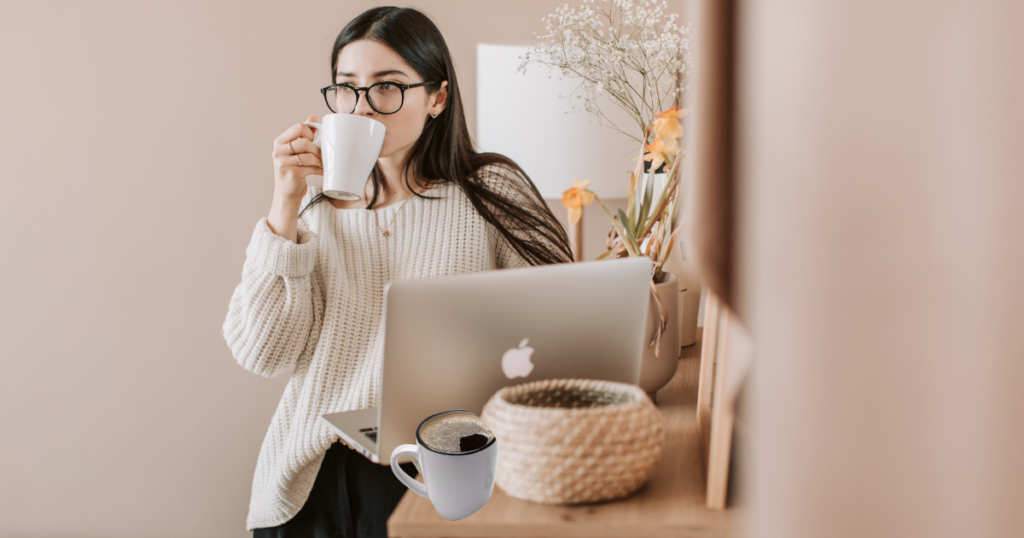Many people enjoy a cup of coffee after a meal. It’s a common habit worldwide, often seen as a relaxing way to end a meal. But is it okay to drink coffee after eating? Let’s explore this topic in simple terms.

Drinking Coffee After a Meal: Is It Safe?
The short answer is yes, drinking coffee after a meal is generally safe for most people. In fact, many people find it pleasant. The warm, rich flavor of coffee can complement the satisfaction of a good meal. However, there are some things to consider, especially if you have certain health conditions.
Coffee and Acid Reflux: A Potential Issue
If you’re someone who suffers from acid reflux, you might want to think twice before reaching for that cup of coffee after eating. Acid reflux happens when stomach acid flows back into the esophagus, causing discomfort and a burning sensation in the chest, known as heartburn.
Coffee can make the stomach produce more acid, which might make acid reflux worse. When your stomach becomes more acidic, it can cause the uncomfortable symptoms of acid reflux. This doesn’t mean you have to give up coffee altogether, but it might be wise to avoid drinking it right after a meal if you know you have this condition.
The Impact of Caffeine-Coffee After a Meal
Caffeine is the substance in coffee that gives you that boost of energy. It’s what many people rely on to wake up in the morning or to keep going during a long day. But caffeine isn’t without its downsides.
If you drink too much coffee, the high caffeine content can cause some problems. For example, too much caffeine can make it hard to sleep. You might feel jittery, anxious, or even a little shaky. This is because caffeine stimulates your nervous system, giving you that feeling of being “too awake.”
For some people, even a small amount of caffeine can have these effects. If you’re sensitive to caffeine, you might find that drinking coffee after a meal makes you feel restless or overly energized. This can be especially true if you drink coffee later in the day.
Decaffeinated Coffee: A Good Alternative
If you enjoy the taste of coffee but don’t want the effects of caffeine, decaffeinated coffee is a great option. Decaffeinated coffee has most of the caffeine removed, so it doesn’t give you that same energy boost. This can be a good choice if you’re sensitive to caffeine or if you want to enjoy coffee in the evening without worrying about staying awake all night.
Decaf coffee allows you to enjoy the flavor and experience of coffee without the risk of feeling jittery or having trouble sleeping. It’s also a good option for people with acid reflux, as it might be less likely to increase stomach acidity.
To read more —Why Do People Drink Coffee After Dinner?
Moderation Is Key-Coffee After a Meal
The most important thing to remember is that moderation is key. Drinking a small amount of coffee after a meal is generally safe for most people. It can even be part of a healthy lifestyle when enjoyed in moderation.
However, it’s easy to go overboard with coffee. Some people find themselves drinking cup after cup throughout the day, which can lead to excessive caffeine intake. Too much caffeine can have negative effects on your health, including increased heart rate, high blood pressure, and digestive issues.
If you’re someone who loves coffee, try to keep track of how much you’re drinking. It’s easy to lose count, especially if you’re drinking it throughout the day. Keeping your coffee consumption in check can help you avoid the negative effects of too much caffeine.
Listening to Your Body-Coffee After a Meal
Everyone’s body reacts differently to coffee. Some people can drink it all day long without any issues, while others might feel jittery after just one cup. The key is to listen to your body and understand how coffee affects you.
If you notice that coffee makes you feel anxious, restless, or affects your sleep, it might be a sign that you’re drinking too much. On the other hand, if you enjoy a cup of coffee after a meal and don’t experience any negative effects, there’s no reason to stop.
Pay attention to how your body reacts to coffee and adjust your consumption accordingly. This way, you can enjoy coffee as part of your daily routine without any negative side effects.
Conclusion: A Balanced Approach to Coffee
In conclusion, drinking coffee after a meal is generally safe and can be a pleasant experience for many people. However, it’s important to be mindful of how coffee affects your body, especially if you have conditions like acid reflux or are sensitive to caffeine.
Choosing decaffeinated coffee or limiting your coffee intake to moderate amounts can help you enjoy this popular beverage without any negative effects. Remember, moderation is key, and listening to your body is the best way to ensure that you’re making healthy choices.
By understanding how coffee affects you and making adjustments as needed, you can continue to enjoy coffee as part of a balanced, healthy lifestyle. So go ahead, enjoy that cup of coffee after your meal, but do so with mindfulness and moderation.
